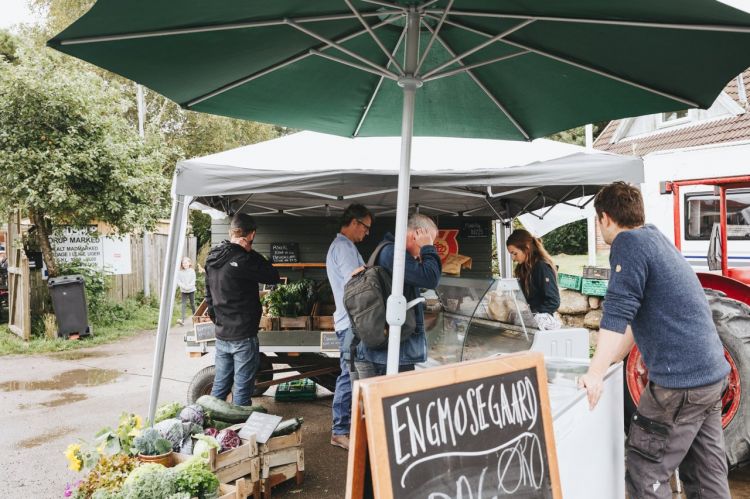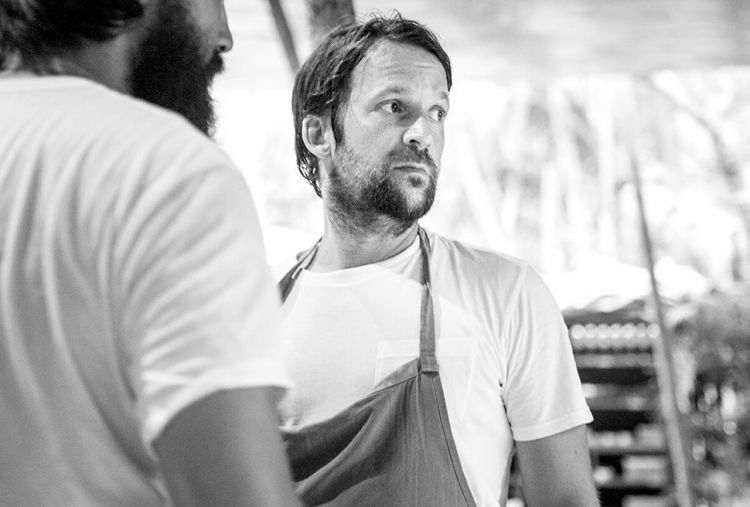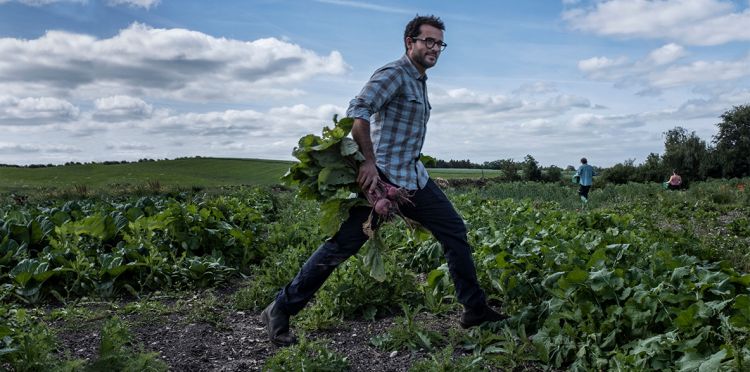During hard times, and the most severe crisis, what you must avoid at all cost is to stand still and wait. There's no need to wait passively for events to complete their cycle. Instead, you need to find strength and ideas to design, reorganise, and look beyond. VisitDenmark, the Danish tourism board that promotes the beauty and the incoming of the Scandinavian country, has made good use of this theory transforming it into a series of virtual events reporting on stories of new beginnings and new projects.
This is how Mad About Denmark was born, a series of three events in collaboration with the Danish Agriculture & Food Council – where exceptional guests and ambassadors of Danish cuisine and culinary culture have discussed some very current themes. The claim plays on the assonance between Danish– "Mad" is the Danish word for food– and English.
MAD Foundation is also the project promoted by René Redzepi, chef and owner of the multi-awarded Noma in Copenhagen, to discuss and analyse the future of gastronomy and how chefs can contribute to the global debate on food and diet. A cradle of new trends and a landing point for food travellers – 40% of the clients in Danish restaurants are foreign – Denmark has made of its "Mad" an international point of reference, a synonym of innovation and now also of sustainability, offering a vision of the what lies ahead for gastronomy.
Journalist and writer Andrea Petrini is the curator of Mad About Denmark and the moderator of the events which had the involvement of some key figures in the food industry of a country that is now considered – given its capacity to innovate and rethink itself constantly – the Silicon Valley of food.
“Reboot Copenhagen”, the first online meeting at the end of February, discussed Copenhagen's answer to the pandemic with a preview of the news expected for 2021. Restaurants reopened in Denmark on the 21st of April, for outdoor service, and on the 6th of May for indoor service, after closing on the 20th of December. All this thanks to the CoronaPass which clients must present by pointing at a QR code obtained from the "My health app", showing their vaccine certificate.

Lisa Abend, American journalist based in Copenhagen and careful observer of the culinary scene of Denmark, also participated. With her René Redzepi, the chef who launched the Nordic Food Manifesto, and who's been since 2003 at the head of the famous Noma, four times at the top of the world, and Matt Orlando, ex head chef at Noma, now at the helm of Amass, a restaurant where modern gastronomy and hospitality meet sustainability. During the lockdown, chefs and patrons revolutionised their concepts completely and had to adapt to new sceneries.
In a pragmatic way, they discussed formats and solutions to rethink the restaurant service, with greater attention to responsibility towards all the people involved: producers, clients and staff. In Copenhagen in the past year, they have opened many restaurants. Noma's answer to the pandemic was POPL, a neighbourhood restaurant where they serve NomaBurgers. Burgers made with organic beef, produced on the western coast of Denmark, and vegan and vegetarian options all handmade in the fermentation lab at Noma. An immediate success.
Matt Orlando, who since 2016 with his Amass “Urban Farm” has obtained the organic certification and uses over 90% of organic and pesticide-free products and drinks, opened Amass Fried Chicken (AFC). A space where you can enjoy the famous super crispy fried chicken covered with powdered vinegar and strictly organic, paired with local ingredients - comfort food for the local community.
And then there are the new projects of Richard Hart, with Hart Brød + Bar, Rosio Sanchez in Nordhavn with Hija De Sanchez Cantina and Poulette, a delicatessen born from organic bar Pompette, in Nørrebro, the mecca of fusion cuisine in Copenhagen. Behind all these projects, however, there's the research tradition of long-term sustainable solutions that for many years has been typical of the Danish offer.
In 1987, Denmark was the first country in the world to introduce laws on organic farming, with very strict national standards to get the organic certification. Pioneers of the New Nordic movement, based on offering local, seasonal food cultivated in a sustainable way, as many as 11 Danish restaurants received in 2020 the green star, a prize given by the Michelin Guide to restaurants that are in the frontline in offering sustainable cuisine.
Danish farming aims to reach a zero impact on the climate by 2050, following a precise model of economic sustainability. For meat and dairy products, for instance, over 90% of the total production comes from cooperatives owned by farmers, which guarantees constant offer and quality standards, and a strong liaison with the territory.
«The solution is finding ways to produce more with less. Develop new methods that can guarantee that the food production will leave a lower footprint on the climate. Luckily in Denmark we have all the conditions that are necessary to start this project and open the road to the production of food with zero impact», Anne Lawaetz Arhnung, executive director of the Danish Agriculture & Food Council said.
During the second meeting, the topic of sustainability was under the spotlight and René Redzepi was joined by Christian F. Puglisi, patron, chef, activist and deus ex machina of many establishments in Denmark, and Kamilla Seidler Trebbien, co-owner of restaurant Lola e Loui. The latter chef is just back from six years in Bolivia, where she explored the different interpretations of sustainability.

«It was very interesting to see how the European and Danish way of thinking has different applications around the world. In Bolivia they fight to feed as many people as possible. This is their sustainability. In Denmark we're trying to become more sustainable, to return to our roots. It's as if these worlds were clashing, even though their goals are the same. In my restaurant I try to work with small producers but it's very complicated because there are easier and cheaper options available. But for us it's a mission, like pursuing projects of work inclusion and training. With Lola Impact, we give a chance to people in difficulty so they can enter the job market, and we try to guarantee to people who have gone through incredible experiences that they can feel part of the time like any other colleague».
For René Redzepi we need to change our value system. «The food of the future will surely be more expensive. Every time something is cheap, someone is paying its price. It's up to us as chefs to dedicate time and resources to find the best local and organic products knowing that this will come at a price. At Noma there are three people dedicated to this task alone. You need commitment so that people can appreciate and perceive the flavour of sustainability. To convince clients we need to be sustainable, we must be capable of presenting delicious dishes, inspiring and desirable. It's very important in order to change habits even outside our restaurants».

For Redzepi the pandemic will surely stimulate a more sustainable approach in restaurants, but this however will be slow, because now everyone is focused on getting their finances back on track: «This is a moment for thinking, I'm working hard on researching solutions and projects for people who have worked in the frontline to fight the virus».
This is why Noma launched an initiative that will reward 175 people – from all over the planet – who have helped their community, on a small or large scale, during the pandemic. «The first day of opening is to be dedicated to 75 Danish local heroes. Then other 100 dinners will be served to international heroes, once the travel regulations are established. We decided that we couldn't open without thinking of what has happened this year. So we want to do something for the "heroes of the pandemic". The "nominees" will dine for free, and have the possibility of having a guest with them».

Finally Christian F. Puglisi pointed out that in order to succeed sustainable projects - like the one he launched 5 years ago with Farm of Ideas, where he produces the ingredients for his restaurants – need a system and decisions that are not «extremely complex and strict. In Denmark we're more focused on a standardised and industrialised export market, products that are easy to ship, sell and understand. This makes local farming difficult. With my Farm I wanted to create something different, that could give us a varied production, which is difficult if you follow a sales-logic. Our task is to seek diversity. But it's much harder to translate it into business. On top of sustainability there's responsibility. You must make choices that are aware and responsible towards yourself. Because we cannot just think about tomorrow, but about our lives in 10 years' time too».
For info on the activities of the Danish Tourism Board visit www.visitdenmark.com.
Translated into English by Slawka G. Scarso